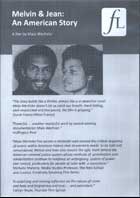
Melvin and Jean. An American Story 2013
Distributed by Filmakers Library, 124 East 40th Street, New York, NY 10016; 202-808-4980
Produced by Whatsup Films
Directed by Maia Wechsler
DVD, color, 59 min.
Sr. High - General Adult
African Americans, Civil Rights, Racism, Social problems
Date Entered: 10/02/2014
Reviewed by Timothy W. Kneeland, History and Political Science Department, Nazareth College of Rochester, Rochester, NYMelvin and Jean is the story of Melvin and Jean McNair, an African American couple who in 1972 hijacked a plane, held it for a one million dollar ransom and then demanded to be flown to Algeria, where they sought exile. The film tells their story of growing up in an oppressive situation in the 1950s and 1960s and strives to understand why this seemingly ordinary couple felt compelled to hijack a plane and abandon their country of birth. The director also seeks to show the redemption of Melvin and Jean who ended up in Paris, France where they moved on from their criminal behavior to become integrated citizens who have a desire, one day, of returning home.
Melvin and Jean are at the center of the documentary, but Maia Wechsler intertwines video footage from the hijacking with discussion from Melvin’s siblings who recall how their brother went from an apolitical athlete to political terrorist. FBI agents who were involved in the hostage crisis and the pilot of the hijacked airplane are also interviewed. The pilot, William May, produces some fine moments as he himself shows development from 1972 to the present. May bears no recrimination for the couple and reflecting back seems to have an understanding of how desperate the times were that led to the couple’ decision to take the plane by force. The documentary concludes in present day with the reconciliation between Melvin and William May.
The film is a solid contribution on the past and present state of race in America. The only criticism of the film is that it tries but never satisfactorily explains the motive for Melvin and Jean’s desperate decision to flee the U.S. While they truly felt systemic oppression and overt racism while growing up in the American South, so too did Melvin’s two siblings who chose to stay and fight for civil rights. The question of motive may provide great fodder for classroom discussion about the decisions and commitments we must make as individuals.